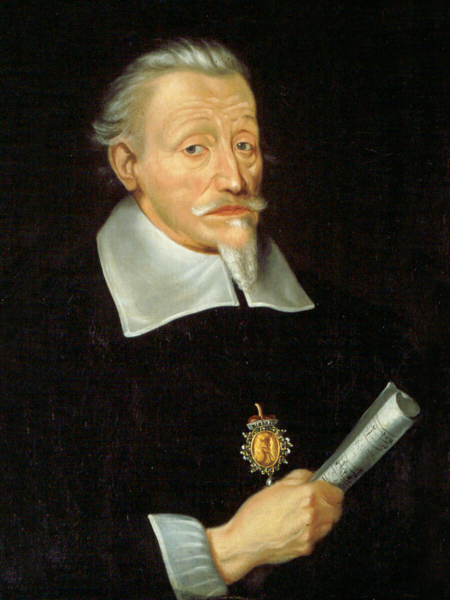Heinrich Schütz (1585–1672)
Heinrich Schütz zählt zu den bedeutendsten deutschen Komponisten des Frühbarock. Sein Oeuvre umfasst ausschließlich Vokalwerke, sowohl im Stil der älteren polyphonen Motette als auch im neuen konzertierenden Stil mit obligatem Generalbass.
Heinrich Schütz wurde 1585 in Köstritz, dem heutigen Bad Köstritz in Thüringen, geboren.
Landgraf Moritz von Hessen-Kassel, der 1599 sein musikalisches Talent entdeckte, ermöglichte ihm in den folgenden Jahren eine musikalische Ausbildung als Sängerknabe an der Kasseler Hofschule Collegium Mauritianum, wo er auch das Orgelspiel und Komponieren erlernte.
Ab 1608 folgte ein Studium der Jurisprudenz in Marburg. Ein Stipendium des Landgrafen ermöglichte Schütz eine dreijährige Studienreise nach Venedig, wo er bei dem Organisten Giovanni Gabrieli, einer wichtigen Persönlichkeit am Übergang von der Renaissance zum Barock, lernte. Während seiner Zeit in Venedig komponierte Schütz eine Sammlung von Madrigalen.
1613 erhielt Schütz eine Anstellung als 2. Hoforganist in Kassel, 1617 wurde er kurfürstlich-sächsischer Kapellmeister in Dresden. Ein Jahr später brach der Dreißigjährige Krieg aus, der zu einem fast vollständigen Zusammenbruch des kulturellen Lebens führte. In den folgenden Jahren reiste Schütz erneut nach Italien, es folgten Aufenthalte und berufliche Verpflichtungen u.a. in Kopenhagen, Hannover, Braunschweig, Hildesheim, Wolfenbüttel und Weimar.
Große Teile seines Lebenswerkes wie die drei Passionen, darunter die Johannes-Passion SWV 481 (1866), stammen aus der Zeit ab 1664.
Sein letztes Werk ist die vollständige Vertonung des 119. Psalms, auch Schwanengesang genannt, aufgeteilt in elf Motetten, gefolgt von einer Vertonung des 100. Psalms und einem deutschen Magnificat.
Schütz starb 1672 im Alter von 87 Jahren in Dresden und wurde in der Dresdener Frauenkirche beigesetzt.









